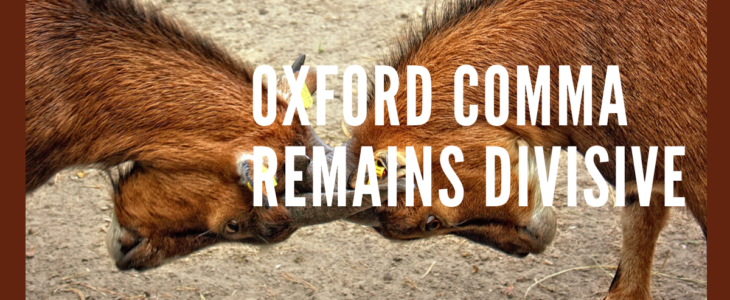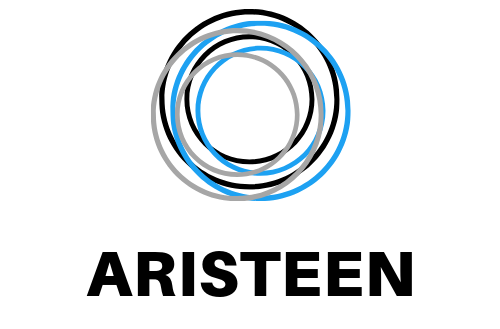
Punctuation generally doesn’t elicit much passion or debate. Then there’s the Oxford comma. Perhaps the most hotly contested punctuation mark of all time, there is no definitive rule regarding its use.
For the uninitiated, the Oxford comma is the comma inserted before the final conjunction (and/or/nor) in a list or series of items.
Here’s a common example: the good, the bad, and the ugly. The red comma before the conjunction and is the Oxford comma.
Without the Oxford comma, the series looks like this: the good, the bad and the ugly.
Detractors say the Oxford comma is superfluous, elitist and a sign of bad writing. Supporters say it adds clarity and consistency.
Divisive linguistic device
Social media platforms erupted in 2011 when it was erroneously reported the University of Oxford style guide was dropping the Oxford comma. One punctuation enthusiast tweeted: “Are you people insane? The Oxford comma is what separates us from the animals.”
The Twittersphere has similarly erupted over a more recent Oxford comma incident.
Britain’s Royal Mint issued 3 million Brexit commemorative (also called “comma-morative”) coins bearing the slogan “Peace, prosperity and friendship with all nations” on Jan. 31, 2020. Note there is no Oxford comma following “prosperity.”
This omission sparked fury in the UK.
British novelist Philip Pullman tweeted: “The ‘Brexit’ 50p coin is missing an Oxford comma, and should be boycotted by all literate people.”
An Oxford comma detractor tweeted in response: “I love Philip Pullman but couldn’t disagree more. I loathe the Oxford comma. A comma with a conjunction is grammatically abhorrent.”
It’s ironic these two comma clashes referenced above both transpired on Twitter, the social media platform known for strict character limits.
There’s no doubt this debate will continue amongst English-speaking writers, grammar enthusiasts and editorial style experts the world over.
Rules unclear
The Oxford comma leads to heated grammar disputes because the rules regarding its usage are not clear.
The Associated Press does not require the Oxford comma but it also doesn’t prohibit its usage. Same with digital writing software Grammarly. Most newspapers and other media outlets use AP style, as do many corporate communication departments, corporate websites and professional bloggers.
As if this wasn’t confusing enough, some writing style guides require the Oxford comma, such as “The Chicago Manual of Style,” used primarily for longer printed works, such as books.
Because of its start with the news wire and newspapers, AP style focuses on brevity and simpler punctuation, whereas Chicago does not.
Grammarly editor Brittney Ross explained the situation eloquently:
“Oxford commas are like the Ugg boots of the punctuation world. People either love them or hate them or don’t know what they are.”
Brittney Ross, Grammarly editor
Personal preference
When it comes to the Oxford comma, it’s about personal preference and clarity more than proper grammar or following specific rules. This is partly why Reader’s Digest put the Oxford comma on its list of most confusing grammar rules in the English language.
Note grammarians can’t even agree on terminology. What is commonly known as the Oxford comma is also known as the serial comma or Harvard comma.
Many professional writers agree most sentences that require an Oxford comma for clarity could be remedied via better sentence construction. Aristeen agrees with this logic. We think writing must be concise, especially when it comes to social media and website content.
A recent column in The Federalist put it more bluntly with the headline: Why Using The Oxford Comma Is A Sign Of Bad Writing.
Our guidance regarding the Oxford comma is similar to the advice we offered in our Omit needless words blog post. Keep it short. If you don’t need a comma, don’t use one. It’s that simple.
What comma camp are you in? Let us know!

 Thanks for visiting the Aristeen website. If you are interested in any of our digital marketing or content development services, please contact me directly at
Thanks for visiting the Aristeen website. If you are interested in any of our digital marketing or content development services, please contact me directly at
28 comments on “Inconsistency causes Oxford comma clashes”
angelina
February 15, 2020 at 1:45 PMThanks for raising awareness on Oxford Comma! I haven’t heard of this before so this is something really new to me. I’m glad to have learned a new lesson. Thank you
Lily
February 10, 2020 at 4:09 AMWoah I didnt know this was such a debate or that this was updated in 2011. Wow I guess I need to be more mindful of it now.
WanderlustBeautyDreams
February 7, 2020 at 11:01 AMI didn’t know much about Oxford comma before, thanks for bringing it to light and sharing information about it!
Emman Damian
February 7, 2020 at 4:43 AMThere is a lot of discussion about Oxford comma! I’m very particular with it actually. Not sure why people don’t observe it.
LaToyia Dennis
February 6, 2020 at 5:53 PMWOW! I have never heard of Oxford comma before. I feel ridiculous not knowing about this until now.
Wendy Polisi
February 6, 2020 at 1:52 PMI learned how to use it in school. I use it all the time, but it really doesn’t make a big difference to me.
Heather
February 6, 2020 at 10:46 AMMy friend and I always get into discussion about that comma! I believe you don’t need it, she believes you do.
yana
February 6, 2020 at 7:56 AMthanks for that great explanation, it’s very useful information and honestly I have never heard about Oxford comma before.
Ntensibe Edgar Michael
February 6, 2020 at 7:55 AMWhat??? There is even an Oxford comma? How the hell haven’t I known about this, till this point in my life? Mr. Nkoola would be so disappointed, I am sure.
Eileen M Loya
February 6, 2020 at 5:55 AMI may have been using the Oxford comma but was not aware of it until I read your article. I rely on Grammarly to check my content before I publish. Now that I am aware of this, I will pay more attention to it.
Coralie Seright
February 6, 2020 at 2:27 AMI didn’t use to use an Oxford comma but have picked up the habit since I started blogging. I have always wondered what the right way was. Glad to know its correct either way.
Ching
February 6, 2020 at 2:04 AMIt drives me nuts western people don’t add a comma before the and in series
Brandy
February 5, 2020 at 11:36 PMI overuse the comma and the exclamation points. Just because I like to. Ha! Glad to read this though.
Agnes
February 5, 2020 at 8:43 PMGrammarly app helps me with this Oxford comma. I am now aware of this since I used the app.
chad
February 5, 2020 at 6:46 PMI had no idea this comma had a name, the oxford comma! This is amazing knowledge, looooove it! Thank you so much, great read.
jennifer schreiner
February 5, 2020 at 1:16 PMHA HA HA HA I love this. The oxford comma is what separates us. In all honestly, you are RIGHT! It all comes down to personal preference. Some say stick with Chicago or APA. I am learning a lot with my writing and formal right skills. I just love your article.
aristeen
February 5, 2020 at 4:29 PMThank you!
Matt Taylor
February 5, 2020 at 11:49 AMhahaha it is funny how people argue about the silliest of things, and have very strong opinions about it. I still like and use the Oxford comma, but don’t care if people don’t use it. I like the clarity it brings, there is no guesswork that that item is separate from the one after the and.
Jessica Collazo
February 5, 2020 at 11:05 AMNever heard about this Oxford comma before. Is good that you making people aware about this situation.
aristeen
February 5, 2020 at 4:30 PMThe struggle is real! Thanks for reading our blog.
Anna
February 5, 2020 at 9:50 AMPersonally, I really like using the Oxford comma in some cases. For example when I’m listing phrases (not single words) or when I want to make a pause for effect. I’ll only use it if it makes the reading significantly easier.
Sadiq Saleem
February 5, 2020 at 7:12 AMAmazing information. Thanks for raising such awareness about Oxford Comma!
I’ve never heard of this before, so it’s something really new to me. I’m very happy that I learned all of that from you.
Mila R
February 5, 2020 at 12:17 AMI just read about Oxford comma and I have to say that I love it and starting to use it. But I know so many people that can’t stand it 😉
Tina Basu
February 4, 2020 at 10:51 PMThis is such a helpful post specially for people who write a lot. Thankfully we have MS Word and Grammarly to help out too.
Denise @In-Home Medical Supplies
February 4, 2020 at 8:00 PMYears ago I took a business English class and they taught us to use the Oxford comma in a series. Of course it wasn’t called the Oxford comma. It was just how to punctuate a series. It’s too late for me to change now–save yourselves 🙂
Maria Elsa Jose
February 4, 2020 at 1:10 AMOh, yes, i am a victim of Oxford comma. Anyway, whatever it is, whatever it was, whatever… oh, is my Oxford comma right?
The truth is I was not aware of that until you said so here in your article. I just go what MS word underlines and what Grammarly dictates. Now, I know! Thank you, my dear, for the added learning, knowledge, and guidance. Now, I can’t stop. Thanks!
aristeen
February 5, 2020 at 4:28 PMYou’re welcome?! The English language is confusing, no doubt. It would be easier if the rules were more clear and consistent.
Krizzia Scollon
February 3, 2020 at 9:30 PMThanks for raising awareness on Oxford Comma! i haven’t heard this before so this is something really new to me. I’m glad to have learned all of these from you